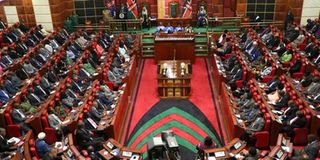Why battle between senators and governors is futile

A joint National Assembly and Senate sitting on March 27, 2014. FILE PHOTO | BILLY MUTAI |
What you need to know:
- Enemies: Powerful enemies have been eager to facilitate fights between senators and governors.
- The question has to be: How can the Senate be reformed to give minorities a say, even as majorities have their way?
The difficulties facing devolution have recently been compounded by the face-off between governors and senators arising from differences on how accountability between the two sets of elected representatives should be exercised.
The two issues that have led to the ongoing friction are, first, the establishment of county development boards, which were recently introduced.
The second problem arises from attempts by the Senate to compel the personal attendance by governors at meetings to consider issues of financial management by the counties.
Governors have rejected this directive, terming it an attempt to humiliate them.
As regards financial queries, although the Senate can legally call in governors, it is suggested that the practice at the national government level should, as much as possible, be replicated in the relationship between the Senate and county governments.
As the national chief executive, the President does not have to personally attend the Legislature to answer questions about money, as this role is handled by others who surround him.
There is no compelling reason for governors to make a personal appearance before the Senate to address money issues and, where necessary, this is a power that should be exercised sparingly.
Since county governments have been set up in the image of the national government, the functionaries that surround governors are competent to handle the relationship over money with the Legislature.
With regard to county development boards, when writing on the issue in the Nation last week, Elgeyo-Marakwet Senator Kipchumba Murkomen said the amendments are fine since they “were considered and approved by eminent lawyers, including Senators James Orengo, Amos Wako, Kiraitu Murungi, Kithure Kindiki and Moses Wetang’ula.”
He added that the amendments are acceptable because during the public participation phase, a number of civil society organisations, which he named, also supported them. Unfortunately, this defence of the amendments does not address their legality.
BRANCHES OF GOVERNMENT
The main objection by the governors is that senators should not chair the county development boards. However, it is suggested that the composition of the boards, and not the chairing arrangements, is the real problem.
By attribute, governors fall in the executive branch while senators belong to the legislature. Kenya’s constitutional scheme has separated the two branches as a means of promoting accountability.
Quite deliberately, the role for legislators is to provide oversight and an independent review of the actions of the executive.
The involvement of senators in these boards, even if not as chairs, is anomalous, as it negates the independence with which they are expected to exercise their oversight function.
By way of analogy, the fact that national Legislature does not participate in the decision-making organs of the Executive is not considered a problem. On the contrary, it would be a problem if the Legislature sought to be included in committees of the national government.
The Senate, struggling with how to exercise oversight and give meaning to its participation, has chosen individual participation through the boards, rather than collectively as a House.
RAW DEAL
The real problem with the Senate, one that it should seek to address, is that it got a raw deal in the constitutional settlement that created a bicameral legislature.
The Senate was assigned an asymmetrical place, one which does not enable it to effectively check on the National Assembly as a lower House controlled by majorities.
The question has to be: How can the Senate be reformed to give minorities a say, even as majorities have their way?
Rather than fight each other, governors and senators, as natural allies, can work together to increase their respective roles. The opportunity for a constitutional amendment, that the governors appear to be carving out for themselves, should be of interest to the Senate if it wishes to increase its relevance.
Something should also be said about the governors, who have had a difficult relationship, initially with the National Assembly, then the Presidency and now the Senate.
IMPERIAL GOVERNORS
Other than financial irresponsibility, which many governors are guilty of, most of them have emerged as imperial figures in the counties, complete with ostentatious displays that are simply embarrassing.
The assumptions behind devolution were that it would decrease the powers at the centre and the country’s “imperial presidency”. There was no imagination that in the wake of devolution “imperial governors” would emerge all over the country.
Governors have set themselves up for attack because of a pretentious culture they have created in the counties, a mockery of the poverty that surrounds them. Modesty in service, and probity with finances, are indispensable if devolution is to succeed, and if governors are to expect the support of others, particularly the senators.
The two sets of elected representatives would do well to recognise that they are most answerable for the success of devolution and that it currently faces many genuine hurdles, without the self-inflicted problems that their quarrel portends. In fairness, the Senate initially defended governors but a deteriorating relationship puts both in jeopardy.
Secondly, these wars are futile as neither of them can win, and further, it is difficult to conceptualise what a victory for either of them would look like.
Thirdly, devolution has powerful enemies outside of these two levels. These enemies have been eager to facilitate the fights between the Senate and the governors, who would be unwise not to recognise that they are being set up to fail.
To overcome the on-going mutually-hurting stalemate, the Senate Speaker and the chair of the Council of Governors should initiate dialogue, to find a solution to the problems they are facing.





